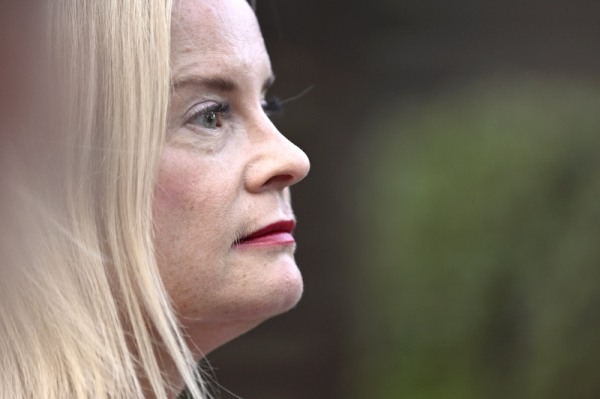Economists warn Purra’s budget cuts threaten growth targets

Finance Minister Riikka Purra (Finns Party) at the Ministry of Finance’s internal budget negotiations in Moisniemi, Espoo, on 6 August 2025. Photo: Mikko Stig / Lehtikuva
- Next Article Purra confirms business subsidy cuts in €1bn savings push
Finance Minister Riikka Purra has proposed €900 million in spending cuts for 2025, triggering criticism from economists and political opposition who argue the plan weakens Finland’s long-term economic prospects.
The proposal includes reductions in education, research, development aid, and municipal funding, while corporate subsidies remain largely intact. Critics say the measures contradict Prime Minister Petteri Orpo’s coalition pledge to foster growth and stabilise public debt.
According to the Ministry of Finance, the budget deficit stands at €9.9 billion. Without new revenue streams, the government aims to close the gap entirely through expenditure reductions. The proposed 2025 budget totals €89.6 billion.
Research director Heli Koski from the Research Institute of the Finnish Economy (Etla) called the cuts to research and innovation funding incompatible with growth objectives. “Support for R&D and higher education is among the few levers available to stimulate productivity and competitiveness,” Koski said.
The government previously committed to raising public research spending to 1.2% of GDP by 2030. Purra now proposes delaying the target until 2035.
Koski warned that shifting regulatory goals could discourage private sector investment. “Frequent changes to research funding create uncertainty and weaken trust,” she said. She also criticised the freezing of university funding indices, which will reduce budgets by €59 million in 2025 and €112 million in 2026.
Lead researcher Tuomas Matikka from the VATT Institute for Economic Research said cuts to education and research damage Finland’s growth capacity. “Budget balancing and sustainable growth are different goals. These measures address only the first,” he said.
Matikka noted the absence of income-side adjustments. “All measures are spending cuts. Economic logic supports raising revenues if the goal is to reduce the deficit.”
The proposal retains most corporate subsidies, prompting further criticism. Matikka described the changes to maritime crew support as symbolic. Koski supported limiting subsidies for cruise ship staff but called for broader reforms. “Forty percent of direct business subsidies are preservationist, not growth-oriented,” she said.
Both experts said structural tax breaks and energy subsidies should be reduced before slashing education and development budgets.
Opposition parties called the cuts politically motivated and uneven. Nasima Razmyar, deputy chair of the Social Democratic Party, described them as “cold and chilling” in a Yle interview. “This government has already reduced funding to youth programmes, culture, and NGOs. Now it proposes more,” she said.
Left Alliance leader Minja Koskela questioned why corporate tax reliefs and subsidies remain intact. “The billion euros the government seeks could be found by reversing tax breaks for high earners and corporations,” she wrote on X.
Green Party chair Sofia Virta said the proposal violates election promises to protect education. She highlighted planned reductions to municipal grants, free education initiatives, and university funding. “Cuts target the most vulnerable – whether children in Finland or globally,” she said in a party statement.
The Centre Party’s Antti Kaikkonen said the plan deepens a “cycle of deprivation” and urged more support for SMEs and middle-income earners.
The budget proposal also includes a freeze on the National Board of Education, whose functions would transfer to the Ministry of Education and Culture.
On migration policy, the budget would eliminate Finland’s annual quota for refugees and end state reimbursements to municipalities for integration support. These measures reflect core positions of Purra’s Finns Party.
Even some coalition members expressed unease. National Coalition MP Heikki Autto said Purra’s approach was “unconventional” but necessary. Finns Party vice-chair Joakim Vigelius defended the plan but said opposition parties must present alternatives. “You cannot balance the economy by simply rejecting every saving proposal,” he said.
Vigelius admitted the budget reflects party priorities, including the removal of refugee quotas and reduced integration spending. “These are secondary costs from the perspective of Finnish taxpayers,” he said.
In defence, Purra highlighted a planned €3 billion increase in defence procurement authorisations, which would multiply current levels sixfold. This follows the spring decision to raise defence spending to 3% of GDP by 2029.
The proposal will go to full government negotiations at the budget session in early September. Ministers from coalition partners have not yet confirmed whether they will seek changes.
HT
- Next Article Purra confirms business subsidy cuts in €1bn savings push
Source: www.helsinkitimes.fi
